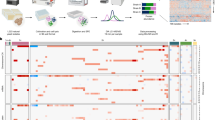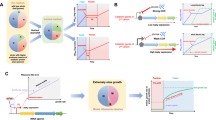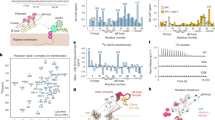Abstract
MORE than ten years ago Bonner1 made an unsuccessful attempt to use inactive variants and biochemical mutants of Penicillium chrysogenum for studying the mechanism of penicillin biosynthesis. Since that time the mechanism of the biosynthesis of the antibiotic has apparently not been investigated in this way.
This is a preview of subscription content, access via your institution
Access options
Subscribe to this journal
Receive 51 print issues and online access
$199.00 per year
only $3.90 per issue
Buy this article
- Purchase on Springer Link
- Instant access to full article PDF
Prices may be subject to local taxes which are calculated during checkout
Similar content being viewed by others
References
Bonner, D., Arch. Biochem., 3, 1 (1947).
Mindlin, S. Z., and Alikhanian, S. I., Doklady Akademyi Nauk SSSR, 111, 4, 884 (1956).
Selzer, G. B., Wright, W. W., Antibiot. and Chemother., 7, 6, 292 (1957).
Author information
Authors and Affiliations
Rights and permissions
About this article
Cite this article
ALIKHANIAN, S., ORLOVA, N., MINDLIN, S. et al. Genetic Control of Oxytetracycline Biosynthesis. Nature 189, 939–940 (1961). https://doi.org/10.1038/189939b0
Issue Date:
DOI: https://doi.org/10.1038/189939b0
This article is cited by
-
Regulation of biosynthesis of secondary metabolites
Folia Microbiologica (1969)
Comments
By submitting a comment you agree to abide by our Terms and Community Guidelines. If you find something abusive or that does not comply with our terms or guidelines please flag it as inappropriate.



